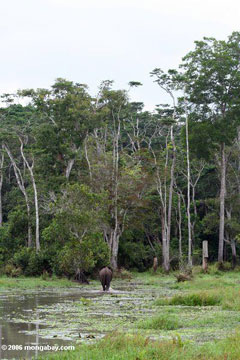Congo cancels logging contracts, calls for sustainable forest management
Congo cancels logging contracts, calls for sustainable forest management
Rhett A. Butler, mongabay.com
April 9, 2007
The new government of the Democratic Republic of Congo (DRC) cancelled more than 20 illegally-granted logging contracts which covered nearly three million hectares (7.4 million acres) of forest, according to a report from AFP.
The announcement came at the “International conference on the sustainable management of the forests in the DRC (ConForDRC)” held February 26-27 in Brussels.
At the conference policymakers agreed that Congo should maintain its moratorium on new logging and provide legal recognition for the rights of indigenous forest dwellers. There was wide support for Congo’s participation in the Coalition of Rainforest Nations’ proposal to seek compensation for forest conservation. The initiative would involve direct payment for carbon sequestration and biodiversity protection.

Photo by Rhett A. Butler |
The conference also saw the release of a World Bank-CIFOR-CIRAD publication entitled “Forests in Post-Conflict Democratic Republic of Congo: Analysis of a Priority Agenda” [PDF]. The study reported that peace and unmanaged road-building can increase pressure on forests but that Congo basin countries have created over 6 million hectares of new protected areas in the past five years. The publication recommended that the government of Congo DRC “include wildlife protection as a standard obligation of forest companies under all contracts.”
The World Bank publication also stated that “sustainable forest management is advancing faster in the Congo basin than in any other tropical region” according to a summary by the International Tropical Timber Organization (ITTO).
The Congo basin is home to the second largest rainforest on Earth after the Amazon. In recent years the forest have been threatened by civil strife, logging, poaching, and subsistence agriculture. There are concerns that stability in the region will increase development that will exacerbate environmental problems.
This article used information from reports from ITTO, the World Bank, AFP, and mongabay.com














